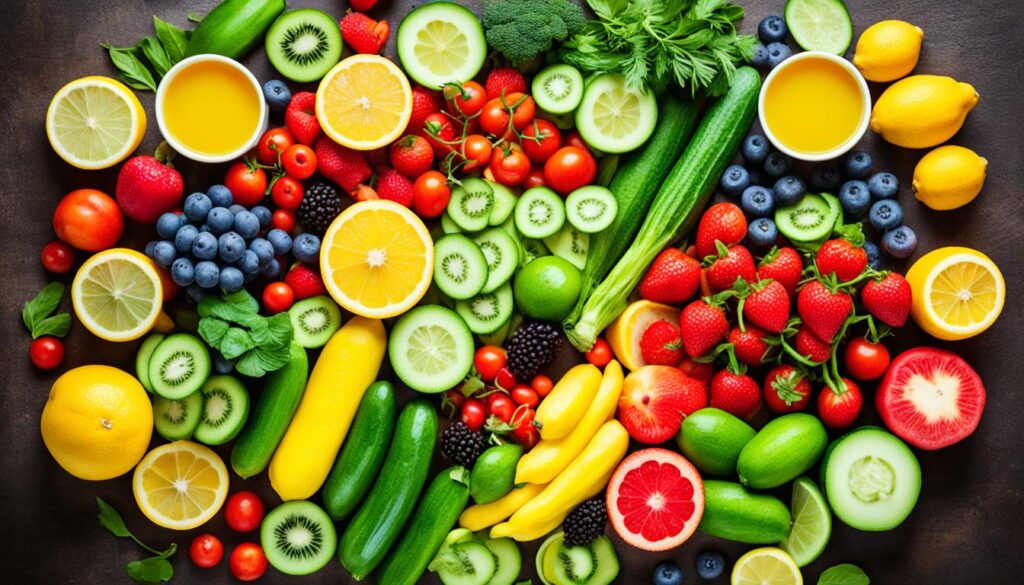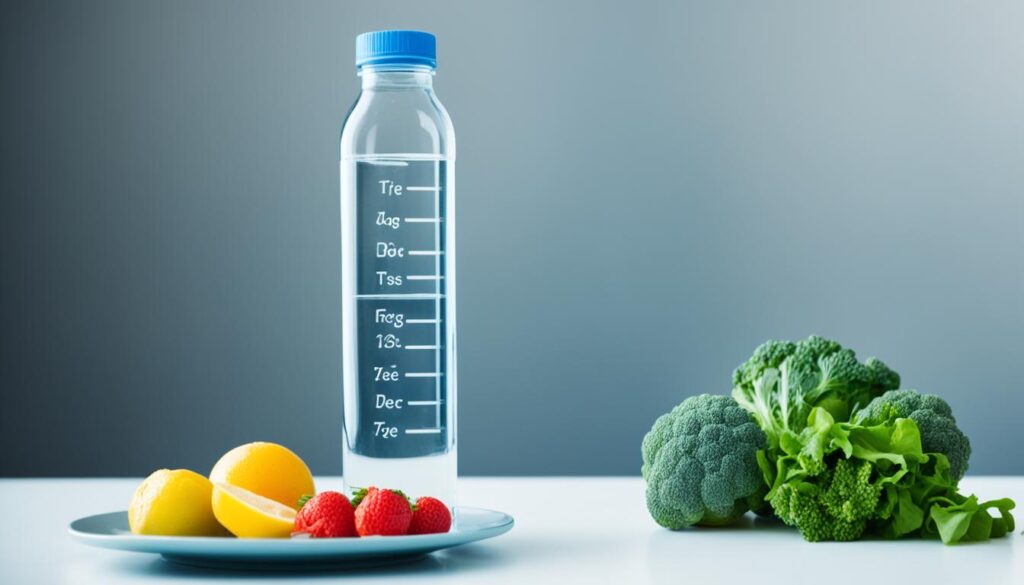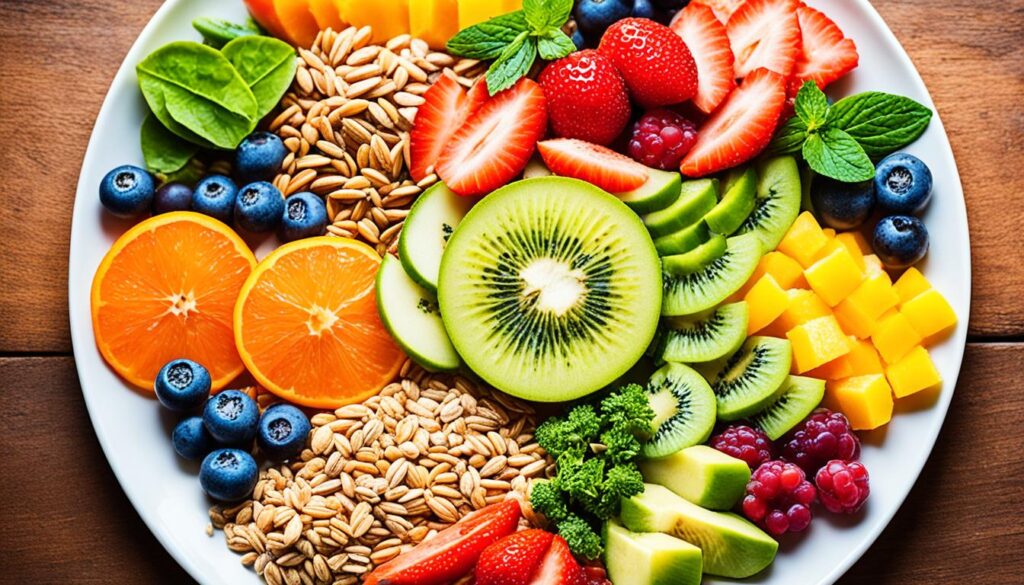In today’s fast world, detox diets are getting a lot of attention for weight loss and wellness. They aim to remove harmful toxins, increase energy, and support a healthier life. But, experts are debating how effective and safe these diets are. Knowing what detox diets do and their possible benefits can help people make better health choices.
Key Takeaways :Detox Diets Can Weight Loss
- Detox diets aim to remove toxins from the body through fasting, strict eating, supplements, and colon cleanses.
- Benefits like avoiding processed foods and drinking more water can be achieved with simpler changes in diet and lifestyle.
- There’s not much research on detox diets, and what studies exist have issues, making it hard to say if they work.
- Detox diets might not offer big health gains and could be risky, especially for people with health issues.
- For better health, a balanced diet, staying hydrated, and regular exercise are more reliable and effective ways to help the body detox naturally.
What Are Detox Diets?
Detox diets are popular for removing pollutants, synthetic chemicals, heavy metals, and other toxins from the body. These diets are short-term and focus on getting rid of toxins to improve wellness. But what are these diets, and how do they work?
Common Detox Diet Methods
Detox diets use different methods, including:
- Fasting – Only drinking juices or herbal teas for a while.
- Dietary supplements – Taking vitamins, minerals, and herbs to help with detoxification.
- Colon cleansing – Using enemas or laxatives to clear the colon of waste.
- Allergy elimination – Staying away from foods that cause allergic reactions and add to toxin buildup.
- Sauna therapy – Sweating out toxins through the skin with heat.
Targeted Toxins for Elimination
Detox diets don’t usually say which toxins they’re targeting, and there’s not much science backing their success. The body can naturally detox itself, but some chemicals like persistent organic pollutants, phthalates, bisphenol A, and heavy metals are hard to get rid of. They can stay in fat tissue or blood.
Do Detox Diets Really Work?

Many people talk about whether detox diets really help. Some say they feel more alert and full of energy after a detox. This might be because they cut out processed foods, alcohol, and unhealthy stuff. They also eat more vitamins and minerals.
But, not everyone feels good during a detox. Some feel unwell. The quick weight loss seen with detox diets often comes from losing fluid and carb stores, not fat. This weight usually comes back soon after the detox ends.
Detox diets with short-term fasting might make you healthier like intermittent fasting. But, not everyone gets these benefits. Some might feel more stressed and start binge eating.
The real value of detox diets is still up in the air. Some people see some benefits, but the lasting effects on weight loss, energy, and well-being aren’t clear. It’s wise to be careful with detox diets. Always talk to a healthcare expert to see what’s best for you.
Potential Benefits of Detox Diets

Detox diets might not be as effective as some say, but they do offer some health perks. By skipping processed foods, toxins, and heavy metals, you help your body detox naturally. This can lead to better digestion and gut health.
Avoiding Processed Foods and Toxins
Detox diets focus on cutting out processed foods and environmental toxins. These foods and substances can fill your body with harmful chemicals, causing health problems. Eating whole, unprocessed foods during a detox lowers your exposure to these potentially harmful substances. This supports your overall wellbeing.
Increased Water Intake
Detox diets stress the need for more water intake. Drinking enough water is key for your body’s detox process. It helps remove toxins and waste products through urine, sweat, and bowel movements. More water also boosts digestion, skin health, and cognitive function.
| Potential Benefits of Detox Diets | Improved Outcomes |
|---|---|
| Avoiding processed foods and toxins | Reduced exposure to harmful chemicals, improved digestion and gut health |
| Increased water intake | Enhanced detoxification, better hydration, improved digestion and skin health |
The debate on detox diets’ effectiveness is ongoing. Yet, some parts of these diets, like avoiding processed foods and drinking more water, can be good for your health. These benefits aren’t just for detox diets. They can be part of a balanced diet and lifestyle.
Detox Diets Can Weight Loss

Detox diets promise quick weight loss, but the outcome is often not what people expect. The weight loss comes mainly from losing fluid and carbs, not fat. This quick weight loss doesn’t last, as the pounds come back soon after stopping the diet.
During a detox, losing fluid and carb stores makes it seem like you’re losing fat. But this effect doesn’t last. Research shows detox diets don’t help with long-term weight loss. The weight lost is usually back after the diet ends.
Detox diets with strict calorie restriction may lead to short-term weight loss. But keeping a healthy weight long-term is hard. The short-term effects of detox diets are noticeable, but the long-term effects are often disappointing, making it hard to keep the weight off.
“Detox diets may lead to rapid weight loss, but this is often due to the loss of fluid and carbohydrate stores rather than fat.”
In conclusion, detox diets may seem to help with weight loss at first, but the weight often comes back quickly. The long-term effects of these diets on weight management are not well supported by research. For lasting weight loss, a balanced diet and lifestyle might be a better choice.
Detox Diets and Short-Term Fasting

Some detox diets can feel like short-term fasting or intermittent fasting. But, the benefits are often short and might not be worth the risks. Studies show that short-term fasting can boost metabolic health in some people. It can improve leptin and insulin sensitivity. But, this isn’t true for everyone, and detox diets might increase stress and binge eating.
The good changes seen in a detox diet are likely short-lived. Short-term fasting has some benefits, but the long-term effects of detox diets are still unclear. If you’re thinking about a detox diet, think carefully about the risks. Talk to a doctor before starting.
| Potential Benefits of Short-Term Fasting | Potential Drawbacks of Detox Diets |
|---|---|
|
|
Short-term fasting has some benefits, but detox diets are unlikely to make lasting health improvements. Instead of detox diets, focus on a balanced diet and lifestyle. This is a better way to support your body’s natural detoxification process.
Safety and Side Effects of Detox Diets

Detox diets claim to cleanse the body and boost wellness. But, they can have big safety issues and side effects. Severe calorie cutting or fasting can make you feel tired, irritable, and have bad breath. It can also lead to energy, vitamin, and mineral shortages.
These diets can cause an imbalance of electrolytes and dehydration. This imbalance may lead to cramping, bloating, nausea, and vomiting.
Severe Calorie Restriction
Detox diets that cut calories a lot can be risky. The body needs a steady supply of nutrients to work right. Not giving it enough calories can cause many problems, including:
- Fatigue and lack of energy
- Irritability and mood swings
- Bad breath due to ketosis
- Deficiencies in vitamins, minerals, and other vital nutrients
Risk of Overdosing
Detox diets also raise the risk of taking too much of supplements, laxatives, diuretics, or water. The detox industry isn’t well-regulated. Ingredient labels might not tell you what’s really in these products. Taking too much of these substances can cause serious and even deadly effects, such as:
- Electrolyte imbalance and dehydration
- Gastrointestinal issues like nausea, vomiting, and cramping
- Organ damage or failure in severe cases
It’s important to be careful with detox diets and talk to a healthcare professional before starting one. Eating a balanced diet, exercising regularly, and supporting your body’s natural detox processes are safer and more effective ways to stay healthy and well.
Risks for Certain Populations
Detox diets might help some people, but others should be careful before starting. This includes teens, older adults, those who are not getting enough nutrients, pregnant or breastfeeding/chestfeeding moms, people with diabetes, and those with eating disorders.
Teens and older adults can be hurt by the strict calorie cuts in detox diets. People who don’t get enough nutrients might lose what little they have, which can make things worse.
Pregnant, breastfeeding, and chestfeeding moms need special nutrition. A detox diet could harm their health and their baby’s growth.
People with diabetes or blood sugar issues might see big changes in their levels with a detox diet. Those with eating disorders could make their condition worse by eating too little.
Before starting a detox or calorie-restricting plan, it’s key for these groups to talk to a doctor. A doctor can make sure the plan is safe, right for them, and watch for any bad effects.
| At-Risk Population | Potential Risks of Detox Diets |
|---|---|
| Adolescents | Adverse effects from severe calorie restriction |
| Older Adults | Adverse effects from severe calorie restriction |
| Malnourished Individuals | Further depletion of nutrient stores |
| Pregnant, Breastfeeding, and Chestfeeding Individuals | Compromised maternal and child health and development |
| Those with Diabetes | Dangerous fluctuations in blood sugar levels |
| Individuals with Eating Disorders | Exacerbation of the condition |
It’s very important for these groups to talk to a doctor before trying detox or calorie-restricting diets. This helps keep them safe and healthy.
Supporting Your Body’s Natural Detoxification

Optimal health and wellness don’t need strict detox diets. The best way to help your body detox is by eating well and living healthily. This method is better for you than extreme detox plans.
Balanced Diet and Lifestyle Choices
Eating a mix of fruits, veggies, lean meats, and fiber gives your body what it needs for detox. Drinking enough water, sleeping well, and exercising regularly also help your detox process.
- Eat a varied, plant-based diet to provide antioxidants and fiber that aid in natural detoxification.
- Stay hydrated by drinking plenty of water to support the kidneys and liver in flushing out toxins.
- Prioritize quality sleep to allow your body to rest and rejuvenate.
- Incorporate regular exercise to promote circulation and eliminate waste products.
Reducing processed foods, alcohol, and toxins helps your detox system work better. These changes are easier to keep up with and better for your health than harsh detox diets.
| Nutrient | Benefits for Detoxification |
|---|---|
| Fiber | Supports regular bowel movements and eliminates toxins |
| Antioxidants | Neutralize free radicals and protect cells from damage |
| Electrolytes | Maintain fluid balance and support kidney function |
By eating well and making healthy choices, you can help your body detox naturally. This leads to lasting weight loss and better health.
“The best detox program is one that supports your body’s natural ability to eliminate toxins, not one that promises quick fixes or unrealistic results.”
Also Read : What Are The Benefits Of Diet Tea?
Conclusion
Detox diets have some benefits, like avoiding processed foods and drinking more water. But, they can’t remove specific toxins or lead to lasting health or weight loss. The science doesn’t back up these claims.
Some detox diets are risky, with extreme calorie cuts or using laxatives and supplements. These methods are dangerous and can cause harm. It’s safer to make lasting changes in diet and lifestyle with a healthcare provider’s advice.
Choosing a healthy diet and changing your lifestyle can help your body detox naturally. This approach supports long-term weight loss and better health. It avoids the dangers of extreme detox plans.
FAQs
Q: What are detox diets and cleanses?
A: Detox diets and cleanses are programs that involve limiting certain foods or food groups to help remove toxins from your body and promote overall health.
Q: How do detox diets work?
A: Detox diets work by eliminating potentially harmful compounds from the body and supporting the liver and kidneys in their natural detoxification processes.
Q: Are detox diets effective for weight loss?
A: Many detox diets claim to help individuals lose weight quickly by reducing calorie intake and promoting the elimination of waste from the body.
Q: What is the lemonade diet?
A: The lemonade diet, also known as the Master Cleanse, is a detox program that involves a period of fasting where individuals consume a beverage made of lemon juice, maple syrup, and cayenne pepper.
Q: Are there health benefits to following a detox diet?
A: Some people believe that detox diets can improve energy levels, promote healthier eating habits, and reduce the consumption of highly processed foods.
Q: What are the potential risks of detox diets?
A: Detox diets that are followed by a strict diet plan may lead to nutrient deficiencies, harmful effects on metabolism, and can even result in starvation if not properly managed.
Q: Is there evidence to support the effectiveness of detox diets?
A: While some individuals may experience short-term weight loss or improved digestion from detox diets, there is limited scientific evidence to support their long-term health benefits.
Source Links
- https://www.healthline.com/nutrition/detox-diets-101
- https://www.medicalnewstoday.com/articles/does-science-support-the-claims
- https://www.health.com/weight-loss/how-to-detox








Leave A Comment